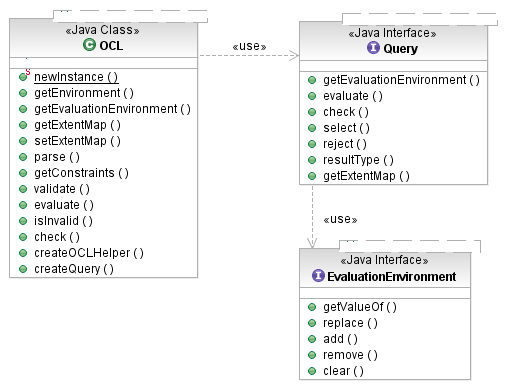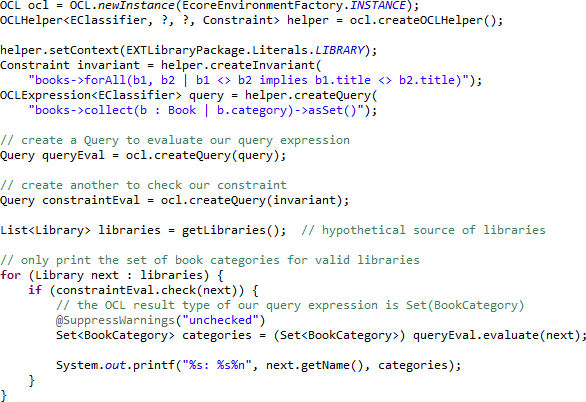In
Parsing Constraints, we saw how to use
the
OCLHelper API for parsing OCL constraints and
query expressions. Parsing constraints is very interesting in itself, but
we can also make OCL come alive in our applications by evaluating these
constraints. For this, OCL provides a
Query API.
Like the
OCLHelper for parsing constraints, the OCL
facade object provides
Query
objects for evaluating constraints and query expressions.

The
Query encapsulates an
EvaluationEnvironment
providing the run-time values of context variables to the OCL interpreter. These
context variables are set and retrieved using the following methods:
-
add(String, Object): adds a name-value binding for a variable -
replace(String, Object): replaces an existing variable binding -
remove(): removes a variable binding -
getValueOf(String): obtains a variable value
The context variables of primary interest are
self
and, in operation constraints, the variables corresponding to its parameters.
The
EvaluationEnvironment API is also used to supply
values for “global” variables added to the parsing
Environment
by the client.
Another important consideration in the evaluation environment is the
allInstances() operation, which obtains the entire
extent of a classifier. For data types, this is a simple problem: the extent
of an
Enumeration is well defined and the extents of
other kinds of
DataType s are undefined. For
Class extents, the
EvaluationEnvironment
provides support for an extent map, mapping classes to the sets of their
instances, as determined by the client. A client sets the extent map using the
OCL.setExtentMap()
method. The default extent map, if none is provided by the client, lazily
computes the extent of a class from the EMF
Resource
containing the context element of the evaluation. An alternative extent map can be
found in
org.eclipse.ocl.ecore.opposites.ExtentMap
.
So, after optionally setting values of context variables (other than
self; the
Query takes care
of this) and an extent map, simply construct a query and use it to evaluate
the expression or check the constraint:

One of the advantages of the
Query API is that a
query’s evaluation environment can be reused for multiple evaluations, as
above. The extent of any classifier is only computed once. For convenience,
however, in situations where only a single evaluation is required, the
OCL class provides shortcuts:

The
Query API also provides methods that work on
multiple elements. The first example, above, could be written more succinctly as:
